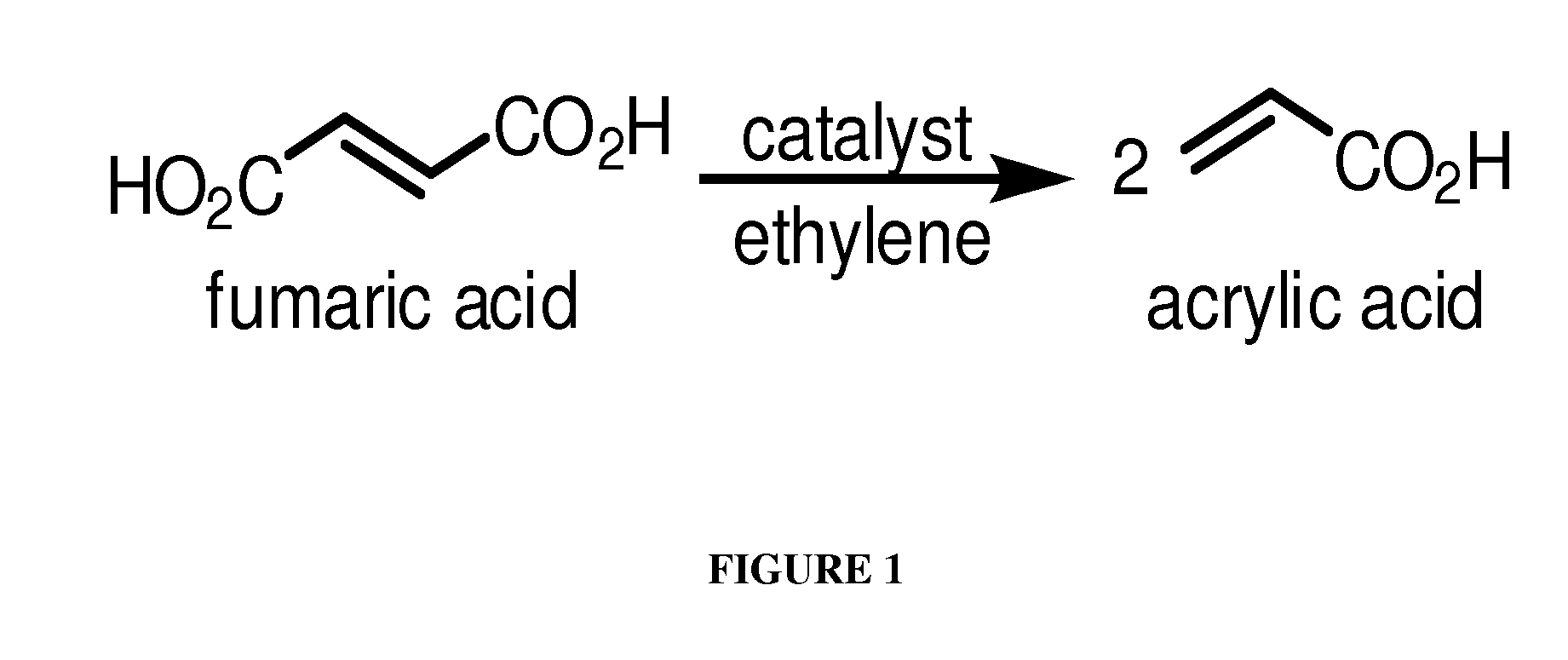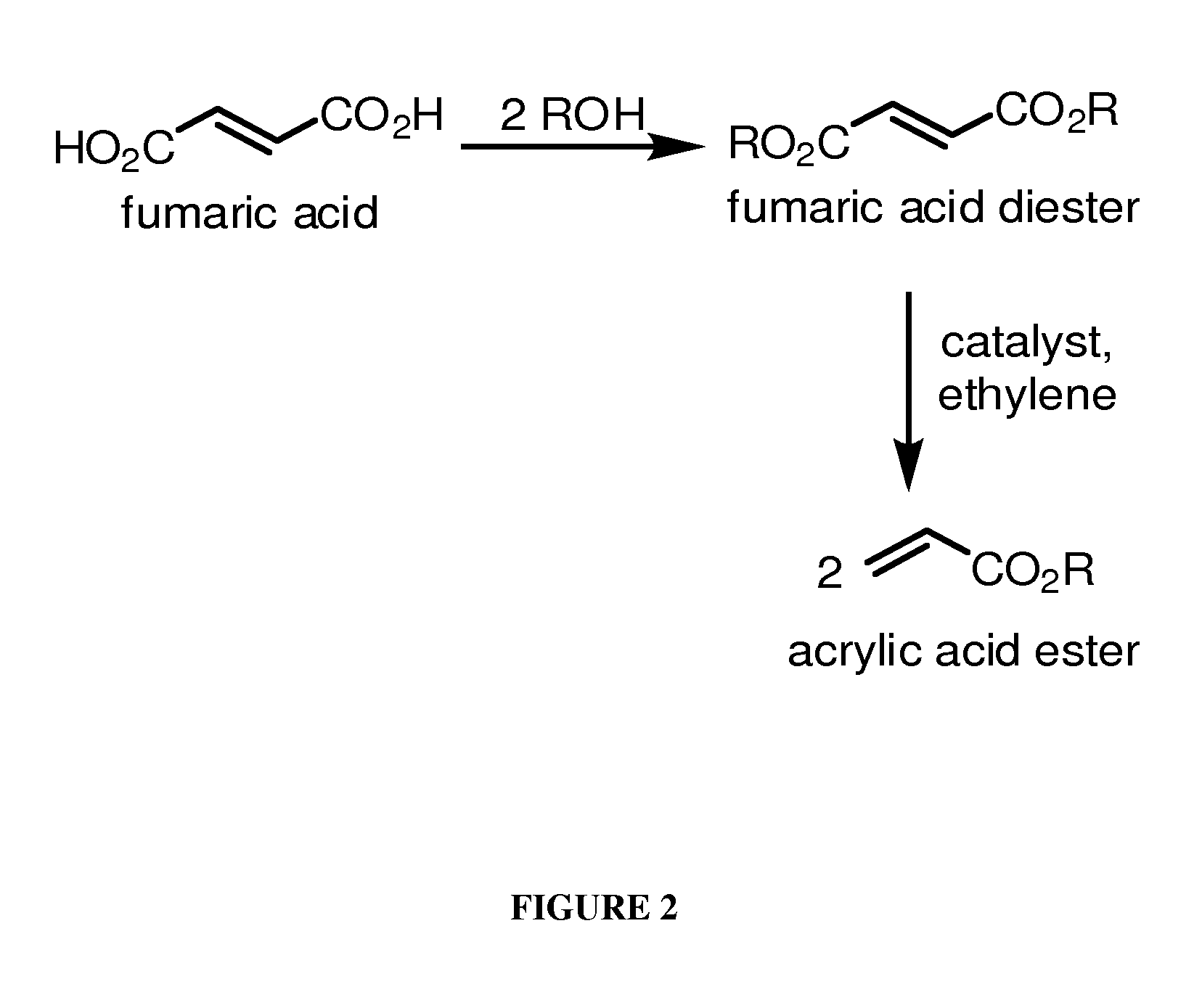Methods for the synthesis of olefins and derivatives
a technology of olefins and derivatives, applied in the preparation of carboxylic compounds, organic chemistry, microorganisms, etc., can solve the problems of insufficient inability to complete biosynthesis of chemical compounds, and high volatility of petroleum feedstocks
- Summary
- Abstract
- Description
- Claims
- Application Information
AI Technical Summary
Problems solved by technology
Method used
Image
Examples
example i
[0141]This Example describes chemical synthesis methods for cross-metathesis of fumaric acid to acrylic acid and esters thereof and for the diesterification of fumaric acid to fumarate diester.
[0142]Acrylic acid from fumaric acid and ethylene: Briefly, a 1 L glass reactor composed of thick wall glass is charged under nitrogen or argon with an appropriate solvent such as dichloromethane or dichloroethane (500 mL), fumaric acid (100 g, 0.86 mol), and the Grubbs Ruthenium metathesis catalyst (1.0-0.01 mol %). After stirring for 10-60 min under nitrogen, the vessel is pressurized with 1.0-5.0 atm of ethylene gas and the reaction is stirred at 0-50° C. over a period of up to 24 hours or until process monitoring indicates the reaction is complete. The unused ethylene is then removed and recovered and the reaction vessel is opened to the atmosphere. The solution is treated with aqueous sodium hydroxide (300-500 mL, 1-5 M solution) and the aqueous layer is extracted twice with the above sol...
example ii
[0147]This Example describes the combined biosynthesis and chemical of acrylic acid.
[0148]Acrylic Acid from biologically produced fumaric acid: Acrylic acid will be produced by reaction between fumaric acid produced by fermentation and ethylene in the presence of a suitable catalyst (e.g., Grubbs catalyst). In this case, a fermentation process is implemented using an organism engineered for high level production of fumaric acid. Performing the metathesis process directly on the fermentation broth following completion of the fermentation process is the preferred process. A general procedure for the combined fermentation and metathesis process is as follows:
[0149]The production organism is grown in a 10 L bioreactor sparged with an N2 / CO2 mixture, using 5 L broth containing 5 g / L potassium phosphate, 2.5 g / L ammonium chloride, 0.5 g / L magnesium sulfate, and 30 g / L corn steep liquor, and an initial glucose concentration of 20 g / L. As the cells grow and utilize the glucose, additional 7...
example iii
[0150]This example demonstrates the conversion of diethylfumarate to ethyl acrylate.
[0151]Example of metathesis of fumarate: In order to demonstrate the feasibility of converting fumarate(s) to acrylate(s) through the addition of ethylene, a series of commercially available metathesis catalysts were screened. The following results demonstrate the ability of the metathesis reaction to take place and suggest areas to explore for enhanced performance.
[0152]General: Experiments were conducted in 150-mL Fisher-Porter pressure bottles at 150 psi. Compressed ethylene (99.95%) was purchased from Praxair and used as received. All solvents and chemicals were purchased from Aldrich Chemicals. Diethyl fumarate (98%) was distilled before use. Diethyl maleate, dimethyl fumarate, ethyl acrylate, and acrylic acid were used as received. All catalysts were prepared by Materia, Inc. and obtained from either Materia or Aldrich Chemicals. All Gas Chromatography (GC) data were acquired with Agilent Techn...
PUM
| Property | Measurement | Unit |
|---|---|---|
| boiling point | aaaaa | aaaaa |
| melting point | aaaaa | aaaaa |
| melting point | aaaaa | aaaaa |
Abstract
Description
Claims
Application Information
 Login to View More
Login to View More - R&D
- Intellectual Property
- Life Sciences
- Materials
- Tech Scout
- Unparalleled Data Quality
- Higher Quality Content
- 60% Fewer Hallucinations
Browse by: Latest US Patents, China's latest patents, Technical Efficacy Thesaurus, Application Domain, Technology Topic, Popular Technical Reports.
© 2025 PatSnap. All rights reserved.Legal|Privacy policy|Modern Slavery Act Transparency Statement|Sitemap|About US| Contact US: help@patsnap.com



